Business Law Report: UK Legal System, Business Structures, and Cases
VerifiedAdded on 2021/01/03
|20
|5854
|27
Report
AI Summary
This report delves into the core concepts of UK business law, beginning with an examination of parliamentary sovereignty and the sources of UK law, including statute law, common law, EU law, and the European Convention on Human Rights. It then explores the role of government in the law-making process, detailing the stages of legislation from proposal to royal assent, and explains the applicability of both common and statutory law in the court of justice. The report further analyzes the impact of company law, employment law, and contract law on businesses, highlighting the differences between legislation, regulations, and standards. Additionally, it examines the nature and formation of different types of businesses, differentiating between incorporated and unincorporated entities, and discussing the advantages and disadvantages of partnerships and companies. The report concludes with legal solutions and recommendations based on case studies.

BUSINESS LAW
Paraphrase This Document
Need a fresh take? Get an instant paraphrase of this document with our AI Paraphraser
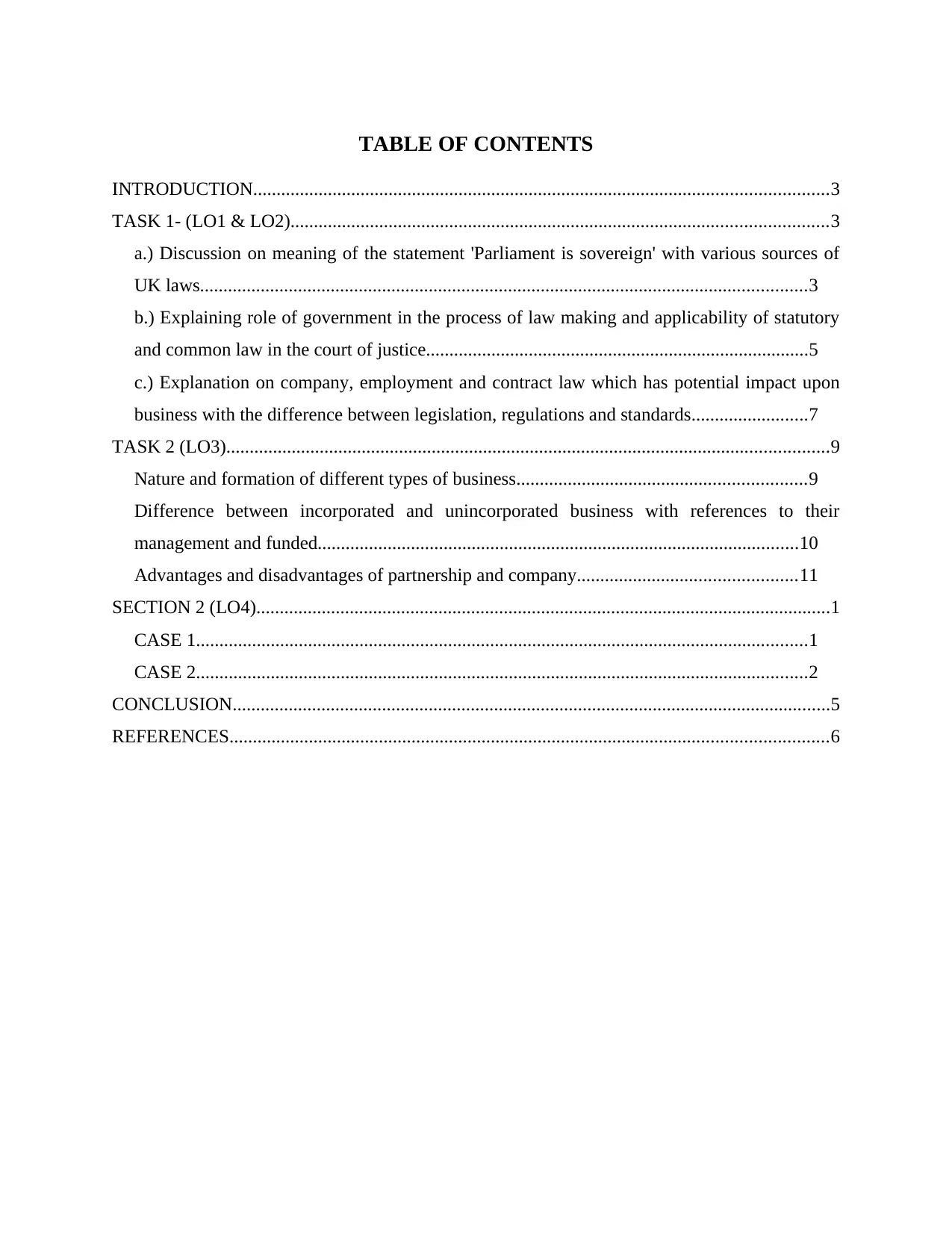
TABLE OF CONTENTS
INTRODUCTION...........................................................................................................................3
TASK 1- (LO1 & LO2)...................................................................................................................3
a.) Discussion on meaning of the statement 'Parliament is sovereign' with various sources of
UK laws..................................................................................................................................3
b.) Explaining role of government in the process of law making and applicability of statutory
and common law in the court of justice..................................................................................5
c.) Explanation on company, employment and contract law which has potential impact upon
business with the difference between legislation, regulations and standards.........................7
TASK 2 (LO3).................................................................................................................................9
Nature and formation of different types of business..............................................................9
Difference between incorporated and unincorporated business with references to their
management and funded.......................................................................................................10
Advantages and disadvantages of partnership and company...............................................11
SECTION 2 (LO4)...........................................................................................................................1
CASE 1...................................................................................................................................1
CASE 2...................................................................................................................................2
CONCLUSION................................................................................................................................5
REFERENCES................................................................................................................................6
INTRODUCTION...........................................................................................................................3
TASK 1- (LO1 & LO2)...................................................................................................................3
a.) Discussion on meaning of the statement 'Parliament is sovereign' with various sources of
UK laws..................................................................................................................................3
b.) Explaining role of government in the process of law making and applicability of statutory
and common law in the court of justice..................................................................................5
c.) Explanation on company, employment and contract law which has potential impact upon
business with the difference between legislation, regulations and standards.........................7
TASK 2 (LO3).................................................................................................................................9
Nature and formation of different types of business..............................................................9
Difference between incorporated and unincorporated business with references to their
management and funded.......................................................................................................10
Advantages and disadvantages of partnership and company...............................................11
SECTION 2 (LO4)...........................................................................................................................1
CASE 1...................................................................................................................................1
CASE 2...................................................................................................................................2
CONCLUSION................................................................................................................................5
REFERENCES................................................................................................................................6
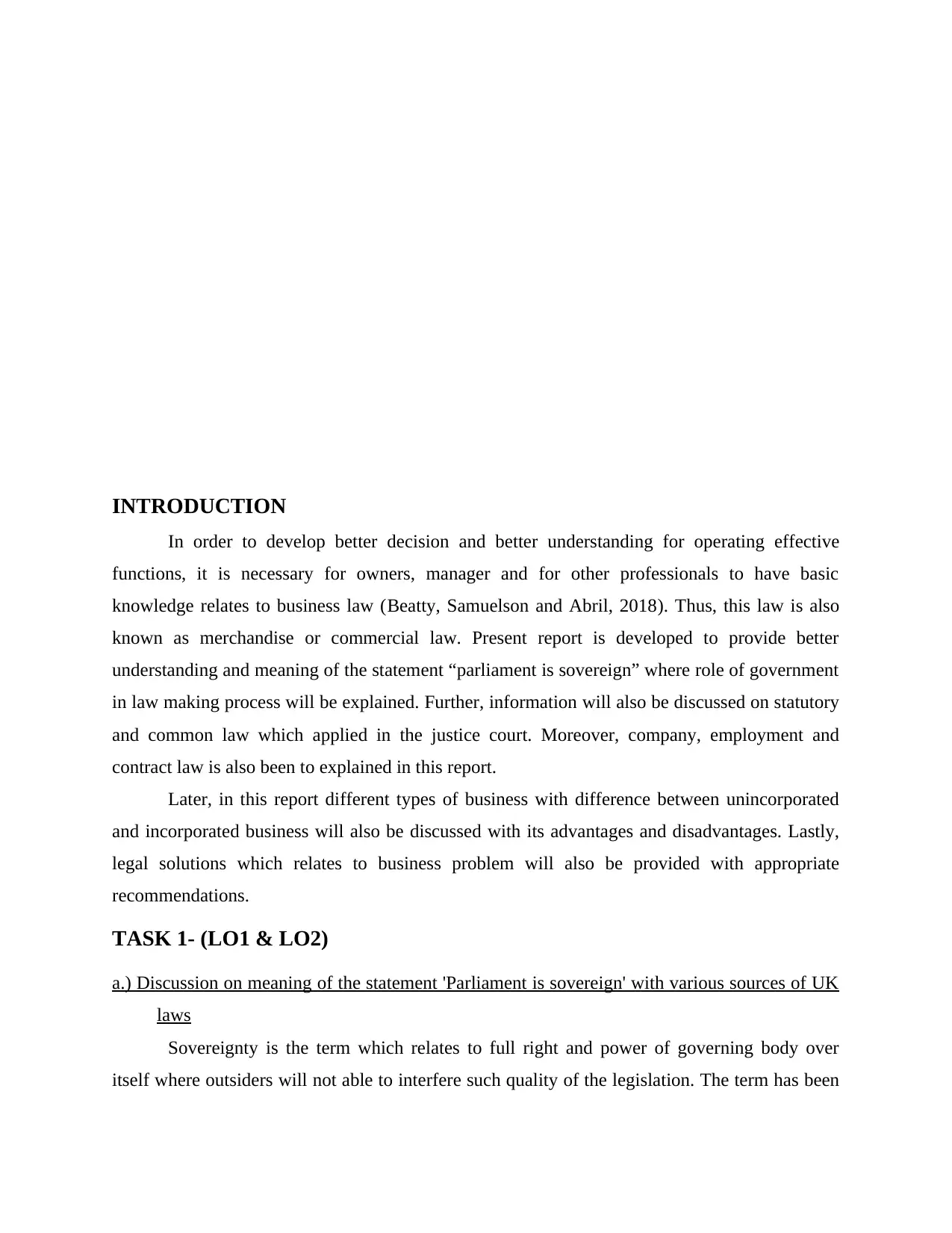
INTRODUCTION
In order to develop better decision and better understanding for operating effective
functions, it is necessary for owners, manager and for other professionals to have basic
knowledge relates to business law (Beatty, Samuelson and Abril, 2018). Thus, this law is also
known as merchandise or commercial law. Present report is developed to provide better
understanding and meaning of the statement “parliament is sovereign” where role of government
in law making process will be explained. Further, information will also be discussed on statutory
and common law which applied in the justice court. Moreover, company, employment and
contract law is also been to explained in this report.
Later, in this report different types of business with difference between unincorporated
and incorporated business will also be discussed with its advantages and disadvantages. Lastly,
legal solutions which relates to business problem will also be provided with appropriate
recommendations.
TASK 1- (LO1 & LO2)
a.) Discussion on meaning of the statement 'Parliament is sovereign' with various sources of UK
laws
Sovereignty is the term which relates to full right and power of governing body over
itself where outsiders will not able to interfere such quality of the legislation. The term has been
In order to develop better decision and better understanding for operating effective
functions, it is necessary for owners, manager and for other professionals to have basic
knowledge relates to business law (Beatty, Samuelson and Abril, 2018). Thus, this law is also
known as merchandise or commercial law. Present report is developed to provide better
understanding and meaning of the statement “parliament is sovereign” where role of government
in law making process will be explained. Further, information will also be discussed on statutory
and common law which applied in the justice court. Moreover, company, employment and
contract law is also been to explained in this report.
Later, in this report different types of business with difference between unincorporated
and incorporated business will also be discussed with its advantages and disadvantages. Lastly,
legal solutions which relates to business problem will also be provided with appropriate
recommendations.
TASK 1- (LO1 & LO2)
a.) Discussion on meaning of the statement 'Parliament is sovereign' with various sources of UK
laws
Sovereignty is the term which relates to full right and power of governing body over
itself where outsiders will not able to interfere such quality of the legislation. The term has been
⊘ This is a preview!⊘
Do you want full access?
Subscribe today to unlock all pages.

Trusted by 1+ million students worldwide
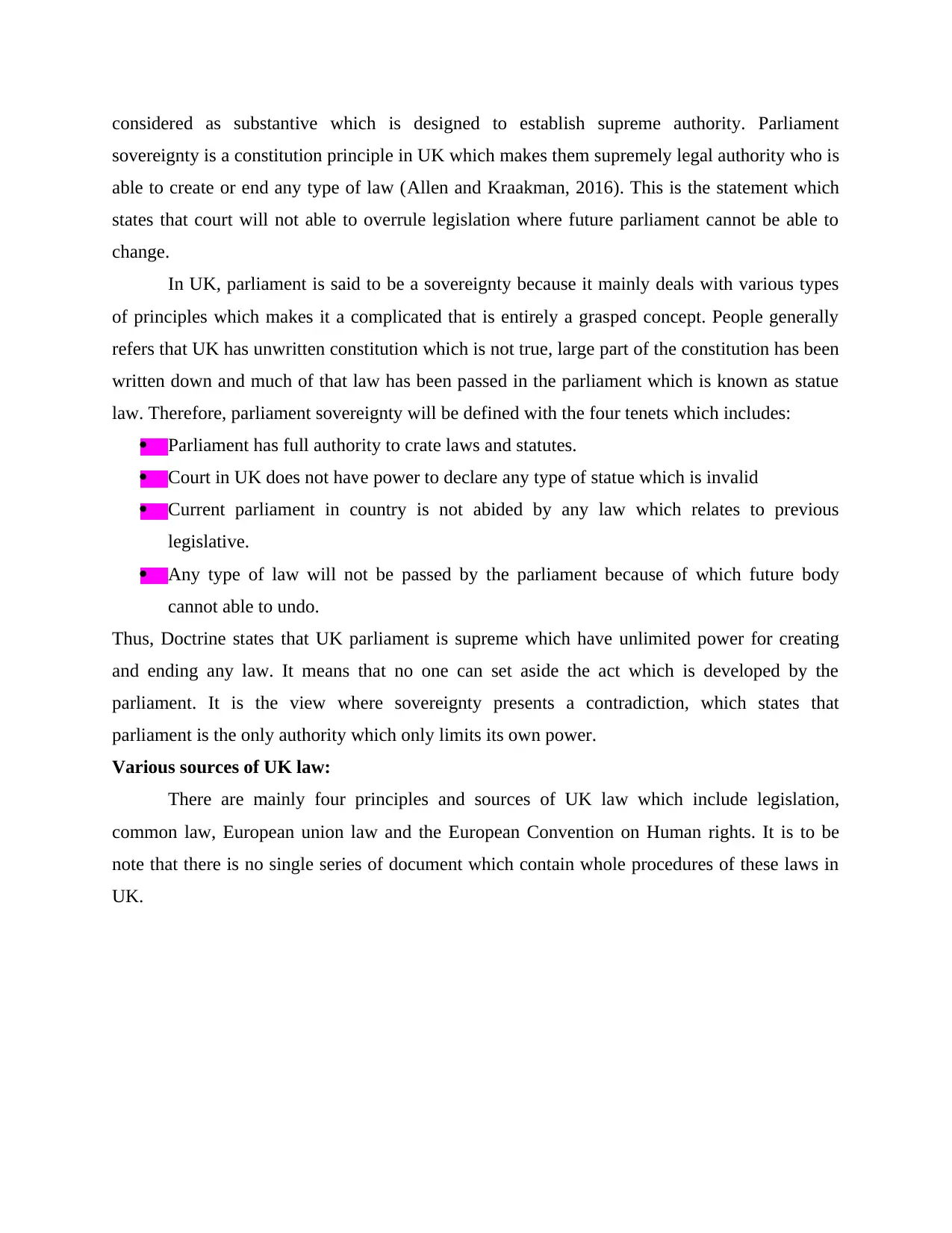
considered as substantive which is designed to establish supreme authority. Parliament
sovereignty is a constitution principle in UK which makes them supremely legal authority who is
able to create or end any type of law (Allen and Kraakman, 2016). This is the statement which
states that court will not able to overrule legislation where future parliament cannot be able to
change.
In UK, parliament is said to be a sovereignty because it mainly deals with various types
of principles which makes it a complicated that is entirely a grasped concept. People generally
refers that UK has unwritten constitution which is not true, large part of the constitution has been
written down and much of that law has been passed in the parliament which is known as statue
law. Therefore, parliament sovereignty will be defined with the four tenets which includes:
Parliament has full authority to crate laws and statutes.
Court in UK does not have power to declare any type of statue which is invalid
Current parliament in country is not abided by any law which relates to previous
legislative.
Any type of law will not be passed by the parliament because of which future body
cannot able to undo.
Thus, Doctrine states that UK parliament is supreme which have unlimited power for creating
and ending any law. It means that no one can set aside the act which is developed by the
parliament. It is the view where sovereignty presents a contradiction, which states that
parliament is the only authority which only limits its own power.
Various sources of UK law:
There are mainly four principles and sources of UK law which include legislation,
common law, European union law and the European Convention on Human rights. It is to be
note that there is no single series of document which contain whole procedures of these laws in
UK.
sovereignty is a constitution principle in UK which makes them supremely legal authority who is
able to create or end any type of law (Allen and Kraakman, 2016). This is the statement which
states that court will not able to overrule legislation where future parliament cannot be able to
change.
In UK, parliament is said to be a sovereignty because it mainly deals with various types
of principles which makes it a complicated that is entirely a grasped concept. People generally
refers that UK has unwritten constitution which is not true, large part of the constitution has been
written down and much of that law has been passed in the parliament which is known as statue
law. Therefore, parliament sovereignty will be defined with the four tenets which includes:
Parliament has full authority to crate laws and statutes.
Court in UK does not have power to declare any type of statue which is invalid
Current parliament in country is not abided by any law which relates to previous
legislative.
Any type of law will not be passed by the parliament because of which future body
cannot able to undo.
Thus, Doctrine states that UK parliament is supreme which have unlimited power for creating
and ending any law. It means that no one can set aside the act which is developed by the
parliament. It is the view where sovereignty presents a contradiction, which states that
parliament is the only authority which only limits its own power.
Various sources of UK law:
There are mainly four principles and sources of UK law which include legislation,
common law, European union law and the European Convention on Human rights. It is to be
note that there is no single series of document which contain whole procedures of these laws in
UK.
Paraphrase This Document
Need a fresh take? Get an instant paraphrase of this document with our AI Paraphraser
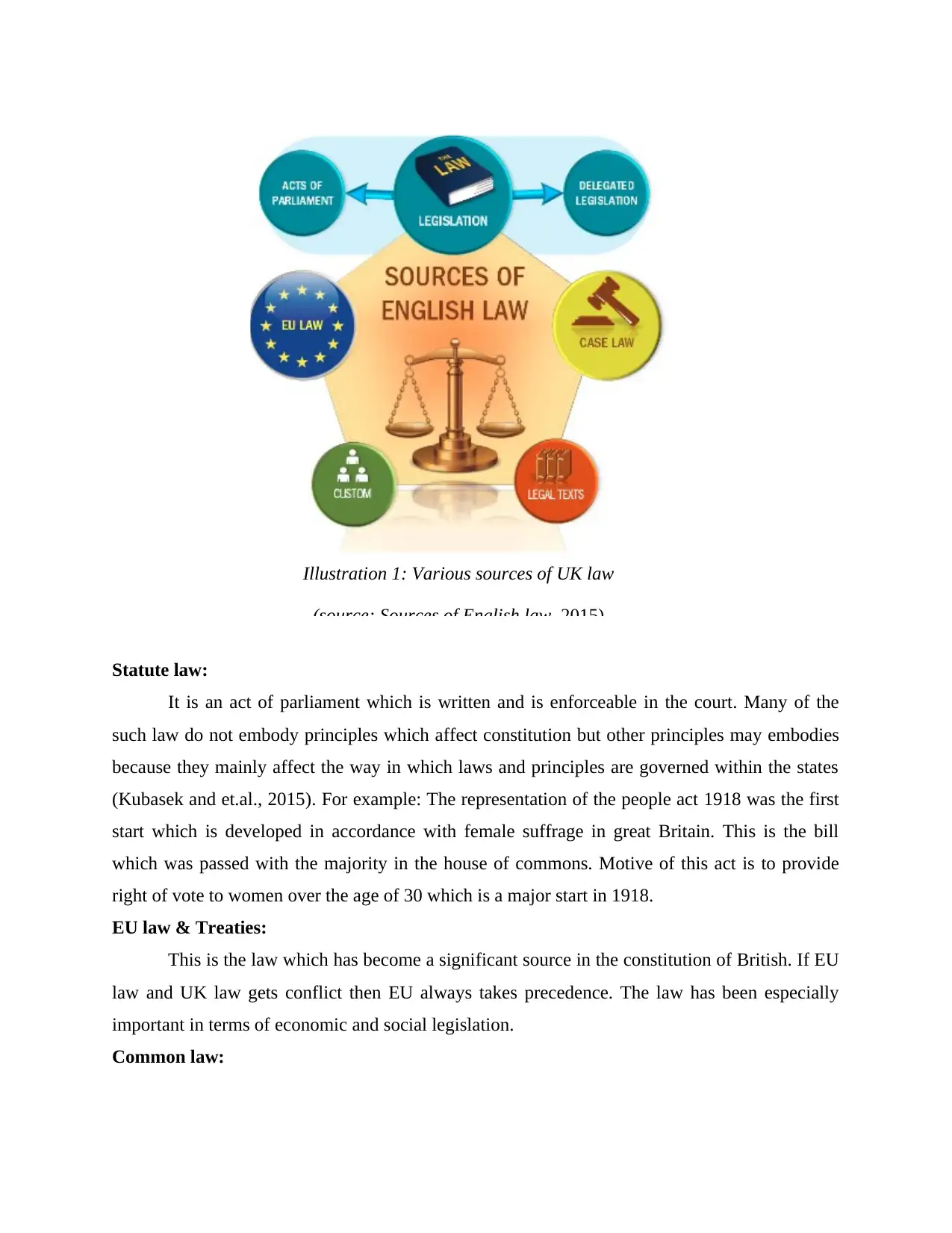
Statute law:
It is an act of parliament which is written and is enforceable in the court. Many of the
such law do not embody principles which affect constitution but other principles may embodies
because they mainly affect the way in which laws and principles are governed within the states
(Kubasek and et.al., 2015). For example: The representation of the people act 1918 was the first
start which is developed in accordance with female suffrage in great Britain. This is the bill
which was passed with the majority in the house of commons. Motive of this act is to provide
right of vote to women over the age of 30 which is a major start in 1918.
EU law & Treaties:
This is the law which has become a significant source in the constitution of British. If EU
law and UK law gets conflict then EU always takes precedence. The law has been especially
important in terms of economic and social legislation.
Common law:
Illustration 1: Various sources of UK law
(source: Sources of English law, 2015)
It is an act of parliament which is written and is enforceable in the court. Many of the
such law do not embody principles which affect constitution but other principles may embodies
because they mainly affect the way in which laws and principles are governed within the states
(Kubasek and et.al., 2015). For example: The representation of the people act 1918 was the first
start which is developed in accordance with female suffrage in great Britain. This is the bill
which was passed with the majority in the house of commons. Motive of this act is to provide
right of vote to women over the age of 30 which is a major start in 1918.
EU law & Treaties:
This is the law which has become a significant source in the constitution of British. If EU
law and UK law gets conflict then EU always takes precedence. The law has been especially
important in terms of economic and social legislation.
Common law:
Illustration 1: Various sources of UK law
(source: Sources of English law, 2015)
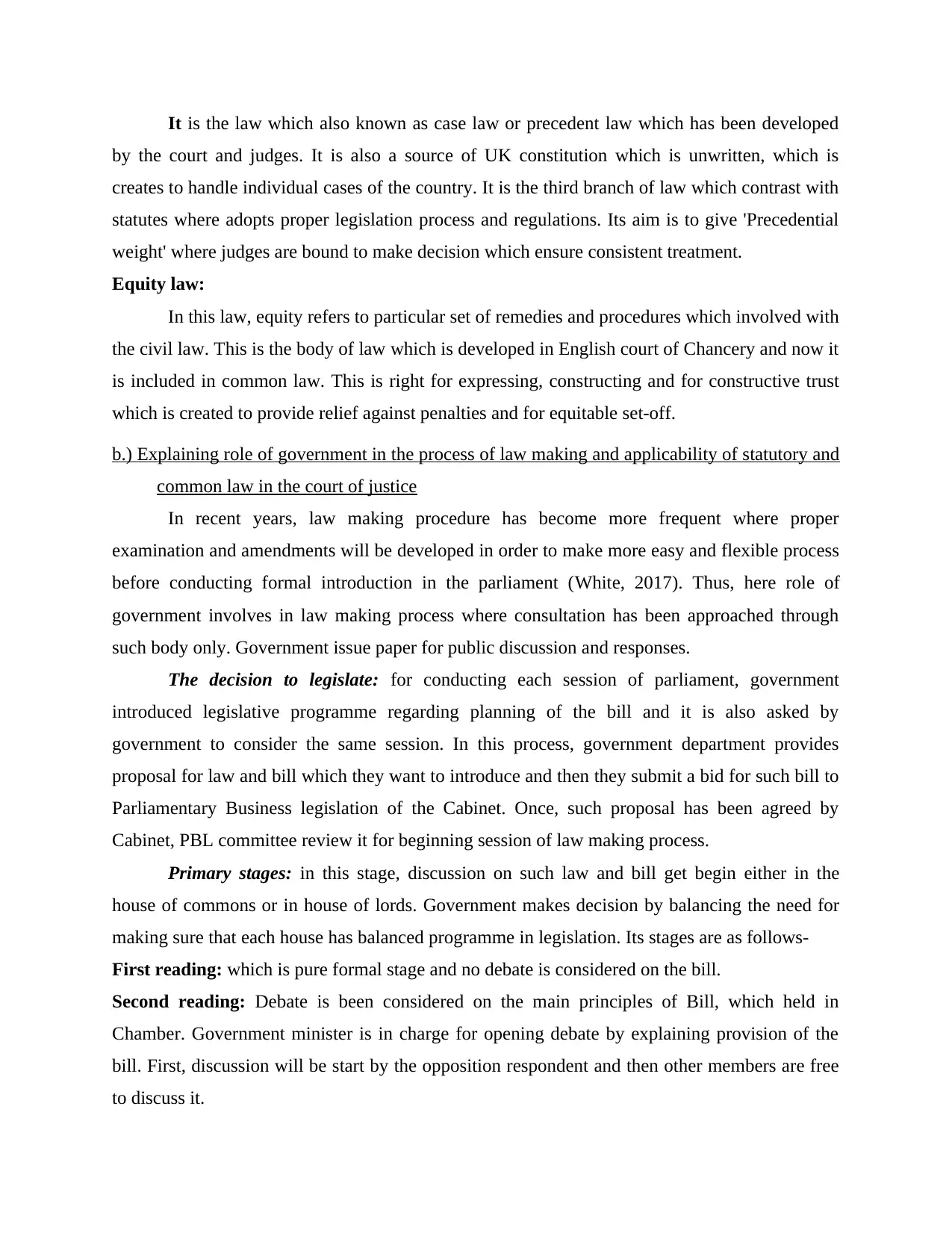
It is the law which also known as case law or precedent law which has been developed
by the court and judges. It is also a source of UK constitution which is unwritten, which is
creates to handle individual cases of the country. It is the third branch of law which contrast with
statutes where adopts proper legislation process and regulations. Its aim is to give 'Precedential
weight' where judges are bound to make decision which ensure consistent treatment.
Equity law:
In this law, equity refers to particular set of remedies and procedures which involved with
the civil law. This is the body of law which is developed in English court of Chancery and now it
is included in common law. This is right for expressing, constructing and for constructive trust
which is created to provide relief against penalties and for equitable set-off.
b.) Explaining role of government in the process of law making and applicability of statutory and
common law in the court of justice
In recent years, law making procedure has become more frequent where proper
examination and amendments will be developed in order to make more easy and flexible process
before conducting formal introduction in the parliament (White, 2017). Thus, here role of
government involves in law making process where consultation has been approached through
such body only. Government issue paper for public discussion and responses.
The decision to legislate: for conducting each session of parliament, government
introduced legislative programme regarding planning of the bill and it is also asked by
government to consider the same session. In this process, government department provides
proposal for law and bill which they want to introduce and then they submit a bid for such bill to
Parliamentary Business legislation of the Cabinet. Once, such proposal has been agreed by
Cabinet, PBL committee review it for beginning session of law making process.
Primary stages: in this stage, discussion on such law and bill get begin either in the
house of commons or in house of lords. Government makes decision by balancing the need for
making sure that each house has balanced programme in legislation. Its stages are as follows-
First reading: which is pure formal stage and no debate is considered on the bill.
Second reading: Debate is been considered on the main principles of Bill, which held in
Chamber. Government minister is in charge for opening debate by explaining provision of the
bill. First, discussion will be start by the opposition respondent and then other members are free
to discuss it.
by the court and judges. It is also a source of UK constitution which is unwritten, which is
creates to handle individual cases of the country. It is the third branch of law which contrast with
statutes where adopts proper legislation process and regulations. Its aim is to give 'Precedential
weight' where judges are bound to make decision which ensure consistent treatment.
Equity law:
In this law, equity refers to particular set of remedies and procedures which involved with
the civil law. This is the body of law which is developed in English court of Chancery and now it
is included in common law. This is right for expressing, constructing and for constructive trust
which is created to provide relief against penalties and for equitable set-off.
b.) Explaining role of government in the process of law making and applicability of statutory and
common law in the court of justice
In recent years, law making procedure has become more frequent where proper
examination and amendments will be developed in order to make more easy and flexible process
before conducting formal introduction in the parliament (White, 2017). Thus, here role of
government involves in law making process where consultation has been approached through
such body only. Government issue paper for public discussion and responses.
The decision to legislate: for conducting each session of parliament, government
introduced legislative programme regarding planning of the bill and it is also asked by
government to consider the same session. In this process, government department provides
proposal for law and bill which they want to introduce and then they submit a bid for such bill to
Parliamentary Business legislation of the Cabinet. Once, such proposal has been agreed by
Cabinet, PBL committee review it for beginning session of law making process.
Primary stages: in this stage, discussion on such law and bill get begin either in the
house of commons or in house of lords. Government makes decision by balancing the need for
making sure that each house has balanced programme in legislation. Its stages are as follows-
First reading: which is pure formal stage and no debate is considered on the bill.
Second reading: Debate is been considered on the main principles of Bill, which held in
Chamber. Government minister is in charge for opening debate by explaining provision of the
bill. First, discussion will be start by the opposition respondent and then other members are free
to discuss it.
⊘ This is a preview!⊘
Do you want full access?
Subscribe today to unlock all pages.

Trusted by 1+ million students worldwide
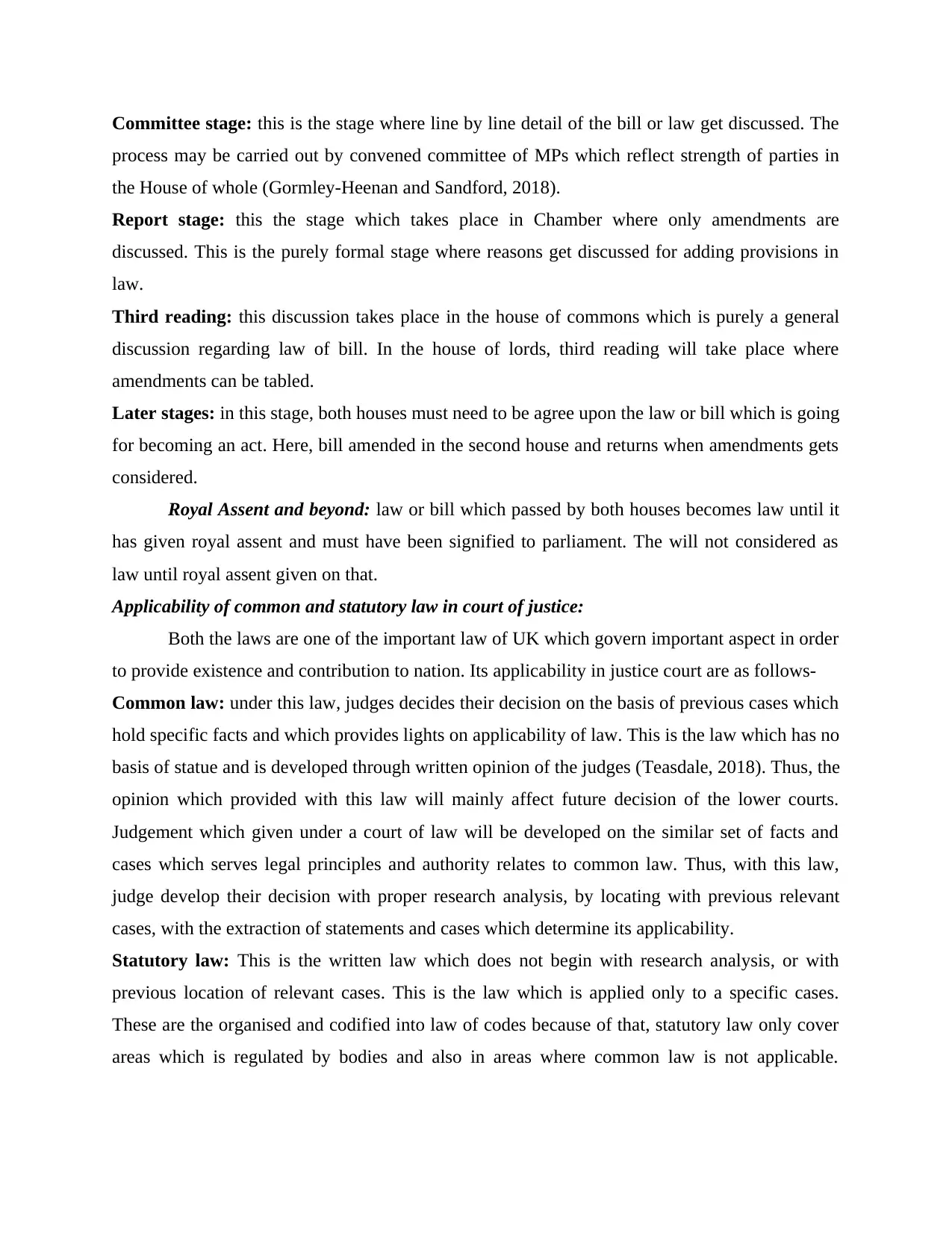
Committee stage: this is the stage where line by line detail of the bill or law get discussed. The
process may be carried out by convened committee of MPs which reflect strength of parties in
the House of whole (Gormley-Heenan and Sandford, 2018).
Report stage: this the stage which takes place in Chamber where only amendments are
discussed. This is the purely formal stage where reasons get discussed for adding provisions in
law.
Third reading: this discussion takes place in the house of commons which is purely a general
discussion regarding law of bill. In the house of lords, third reading will take place where
amendments can be tabled.
Later stages: in this stage, both houses must need to be agree upon the law or bill which is going
for becoming an act. Here, bill amended in the second house and returns when amendments gets
considered.
Royal Assent and beyond: law or bill which passed by both houses becomes law until it
has given royal assent and must have been signified to parliament. The will not considered as
law until royal assent given on that.
Applicability of common and statutory law in court of justice:
Both the laws are one of the important law of UK which govern important aspect in order
to provide existence and contribution to nation. Its applicability in justice court are as follows-
Common law: under this law, judges decides their decision on the basis of previous cases which
hold specific facts and which provides lights on applicability of law. This is the law which has no
basis of statue and is developed through written opinion of the judges (Teasdale, 2018). Thus, the
opinion which provided with this law will mainly affect future decision of the lower courts.
Judgement which given under a court of law will be developed on the similar set of facts and
cases which serves legal principles and authority relates to common law. Thus, with this law,
judge develop their decision with proper research analysis, by locating with previous relevant
cases, with the extraction of statements and cases which determine its applicability.
Statutory law: This is the written law which does not begin with research analysis, or with
previous location of relevant cases. This is the law which is applied only to a specific cases.
These are the organised and codified into law of codes because of that, statutory law only cover
areas which is regulated by bodies and also in areas where common law is not applicable.
process may be carried out by convened committee of MPs which reflect strength of parties in
the House of whole (Gormley-Heenan and Sandford, 2018).
Report stage: this the stage which takes place in Chamber where only amendments are
discussed. This is the purely formal stage where reasons get discussed for adding provisions in
law.
Third reading: this discussion takes place in the house of commons which is purely a general
discussion regarding law of bill. In the house of lords, third reading will take place where
amendments can be tabled.
Later stages: in this stage, both houses must need to be agree upon the law or bill which is going
for becoming an act. Here, bill amended in the second house and returns when amendments gets
considered.
Royal Assent and beyond: law or bill which passed by both houses becomes law until it
has given royal assent and must have been signified to parliament. The will not considered as
law until royal assent given on that.
Applicability of common and statutory law in court of justice:
Both the laws are one of the important law of UK which govern important aspect in order
to provide existence and contribution to nation. Its applicability in justice court are as follows-
Common law: under this law, judges decides their decision on the basis of previous cases which
hold specific facts and which provides lights on applicability of law. This is the law which has no
basis of statue and is developed through written opinion of the judges (Teasdale, 2018). Thus, the
opinion which provided with this law will mainly affect future decision of the lower courts.
Judgement which given under a court of law will be developed on the similar set of facts and
cases which serves legal principles and authority relates to common law. Thus, with this law,
judge develop their decision with proper research analysis, by locating with previous relevant
cases, with the extraction of statements and cases which determine its applicability.
Statutory law: This is the written law which does not begin with research analysis, or with
previous location of relevant cases. This is the law which is applied only to a specific cases.
These are the organised and codified into law of codes because of that, statutory law only cover
areas which is regulated by bodies and also in areas where common law is not applicable.
Paraphrase This Document
Need a fresh take? Get an instant paraphrase of this document with our AI Paraphraser
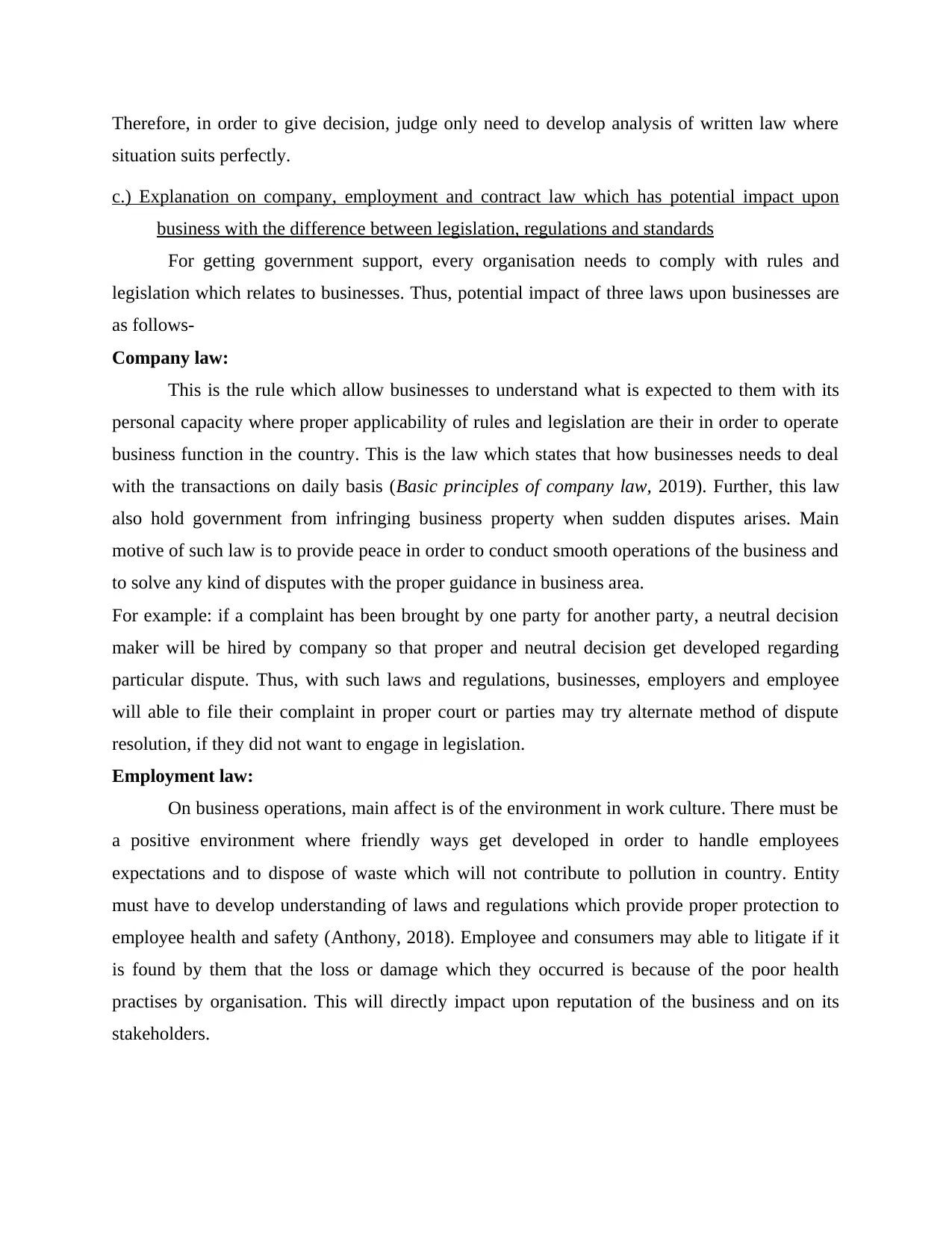
Therefore, in order to give decision, judge only need to develop analysis of written law where
situation suits perfectly.
c.) Explanation on company, employment and contract law which has potential impact upon
business with the difference between legislation, regulations and standards
For getting government support, every organisation needs to comply with rules and
legislation which relates to businesses. Thus, potential impact of three laws upon businesses are
as follows-
Company law:
This is the rule which allow businesses to understand what is expected to them with its
personal capacity where proper applicability of rules and legislation are their in order to operate
business function in the country. This is the law which states that how businesses needs to deal
with the transactions on daily basis (Basic principles of company law, 2019). Further, this law
also hold government from infringing business property when sudden disputes arises. Main
motive of such law is to provide peace in order to conduct smooth operations of the business and
to solve any kind of disputes with the proper guidance in business area.
For example: if a complaint has been brought by one party for another party, a neutral decision
maker will be hired by company so that proper and neutral decision get developed regarding
particular dispute. Thus, with such laws and regulations, businesses, employers and employee
will able to file their complaint in proper court or parties may try alternate method of dispute
resolution, if they did not want to engage in legislation.
Employment law:
On business operations, main affect is of the environment in work culture. There must be
a positive environment where friendly ways get developed in order to handle employees
expectations and to dispose of waste which will not contribute to pollution in country. Entity
must have to develop understanding of laws and regulations which provide proper protection to
employee health and safety (Anthony, 2018). Employee and consumers may able to litigate if it
is found by them that the loss or damage which they occurred is because of the poor health
practises by organisation. This will directly impact upon reputation of the business and on its
stakeholders.
situation suits perfectly.
c.) Explanation on company, employment and contract law which has potential impact upon
business with the difference between legislation, regulations and standards
For getting government support, every organisation needs to comply with rules and
legislation which relates to businesses. Thus, potential impact of three laws upon businesses are
as follows-
Company law:
This is the rule which allow businesses to understand what is expected to them with its
personal capacity where proper applicability of rules and legislation are their in order to operate
business function in the country. This is the law which states that how businesses needs to deal
with the transactions on daily basis (Basic principles of company law, 2019). Further, this law
also hold government from infringing business property when sudden disputes arises. Main
motive of such law is to provide peace in order to conduct smooth operations of the business and
to solve any kind of disputes with the proper guidance in business area.
For example: if a complaint has been brought by one party for another party, a neutral decision
maker will be hired by company so that proper and neutral decision get developed regarding
particular dispute. Thus, with such laws and regulations, businesses, employers and employee
will able to file their complaint in proper court or parties may try alternate method of dispute
resolution, if they did not want to engage in legislation.
Employment law:
On business operations, main affect is of the environment in work culture. There must be
a positive environment where friendly ways get developed in order to handle employees
expectations and to dispose of waste which will not contribute to pollution in country. Entity
must have to develop understanding of laws and regulations which provide proper protection to
employee health and safety (Anthony, 2018). Employee and consumers may able to litigate if it
is found by them that the loss or damage which they occurred is because of the poor health
practises by organisation. This will directly impact upon reputation of the business and on its
stakeholders.
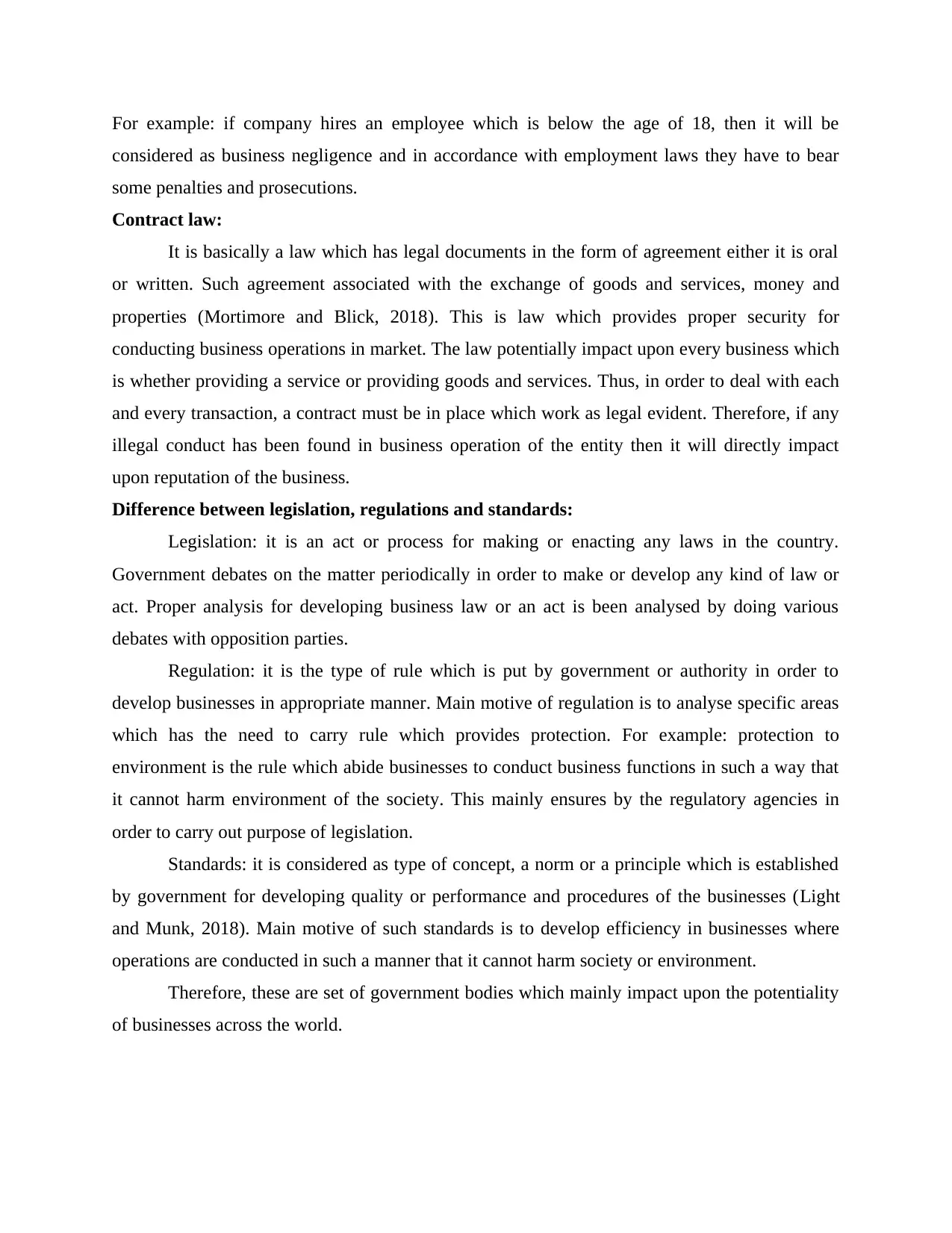
For example: if company hires an employee which is below the age of 18, then it will be
considered as business negligence and in accordance with employment laws they have to bear
some penalties and prosecutions.
Contract law:
It is basically a law which has legal documents in the form of agreement either it is oral
or written. Such agreement associated with the exchange of goods and services, money and
properties (Mortimore and Blick, 2018). This is law which provides proper security for
conducting business operations in market. The law potentially impact upon every business which
is whether providing a service or providing goods and services. Thus, in order to deal with each
and every transaction, a contract must be in place which work as legal evident. Therefore, if any
illegal conduct has been found in business operation of the entity then it will directly impact
upon reputation of the business.
Difference between legislation, regulations and standards:
Legislation: it is an act or process for making or enacting any laws in the country.
Government debates on the matter periodically in order to make or develop any kind of law or
act. Proper analysis for developing business law or an act is been analysed by doing various
debates with opposition parties.
Regulation: it is the type of rule which is put by government or authority in order to
develop businesses in appropriate manner. Main motive of regulation is to analyse specific areas
which has the need to carry rule which provides protection. For example: protection to
environment is the rule which abide businesses to conduct business functions in such a way that
it cannot harm environment of the society. This mainly ensures by the regulatory agencies in
order to carry out purpose of legislation.
Standards: it is considered as type of concept, a norm or a principle which is established
by government for developing quality or performance and procedures of the businesses (Light
and Munk, 2018). Main motive of such standards is to develop efficiency in businesses where
operations are conducted in such a manner that it cannot harm society or environment.
Therefore, these are set of government bodies which mainly impact upon the potentiality
of businesses across the world.
considered as business negligence and in accordance with employment laws they have to bear
some penalties and prosecutions.
Contract law:
It is basically a law which has legal documents in the form of agreement either it is oral
or written. Such agreement associated with the exchange of goods and services, money and
properties (Mortimore and Blick, 2018). This is law which provides proper security for
conducting business operations in market. The law potentially impact upon every business which
is whether providing a service or providing goods and services. Thus, in order to deal with each
and every transaction, a contract must be in place which work as legal evident. Therefore, if any
illegal conduct has been found in business operation of the entity then it will directly impact
upon reputation of the business.
Difference between legislation, regulations and standards:
Legislation: it is an act or process for making or enacting any laws in the country.
Government debates on the matter periodically in order to make or develop any kind of law or
act. Proper analysis for developing business law or an act is been analysed by doing various
debates with opposition parties.
Regulation: it is the type of rule which is put by government or authority in order to
develop businesses in appropriate manner. Main motive of regulation is to analyse specific areas
which has the need to carry rule which provides protection. For example: protection to
environment is the rule which abide businesses to conduct business functions in such a way that
it cannot harm environment of the society. This mainly ensures by the regulatory agencies in
order to carry out purpose of legislation.
Standards: it is considered as type of concept, a norm or a principle which is established
by government for developing quality or performance and procedures of the businesses (Light
and Munk, 2018). Main motive of such standards is to develop efficiency in businesses where
operations are conducted in such a manner that it cannot harm society or environment.
Therefore, these are set of government bodies which mainly impact upon the potentiality
of businesses across the world.
⊘ This is a preview!⊘
Do you want full access?
Subscribe today to unlock all pages.

Trusted by 1+ million students worldwide
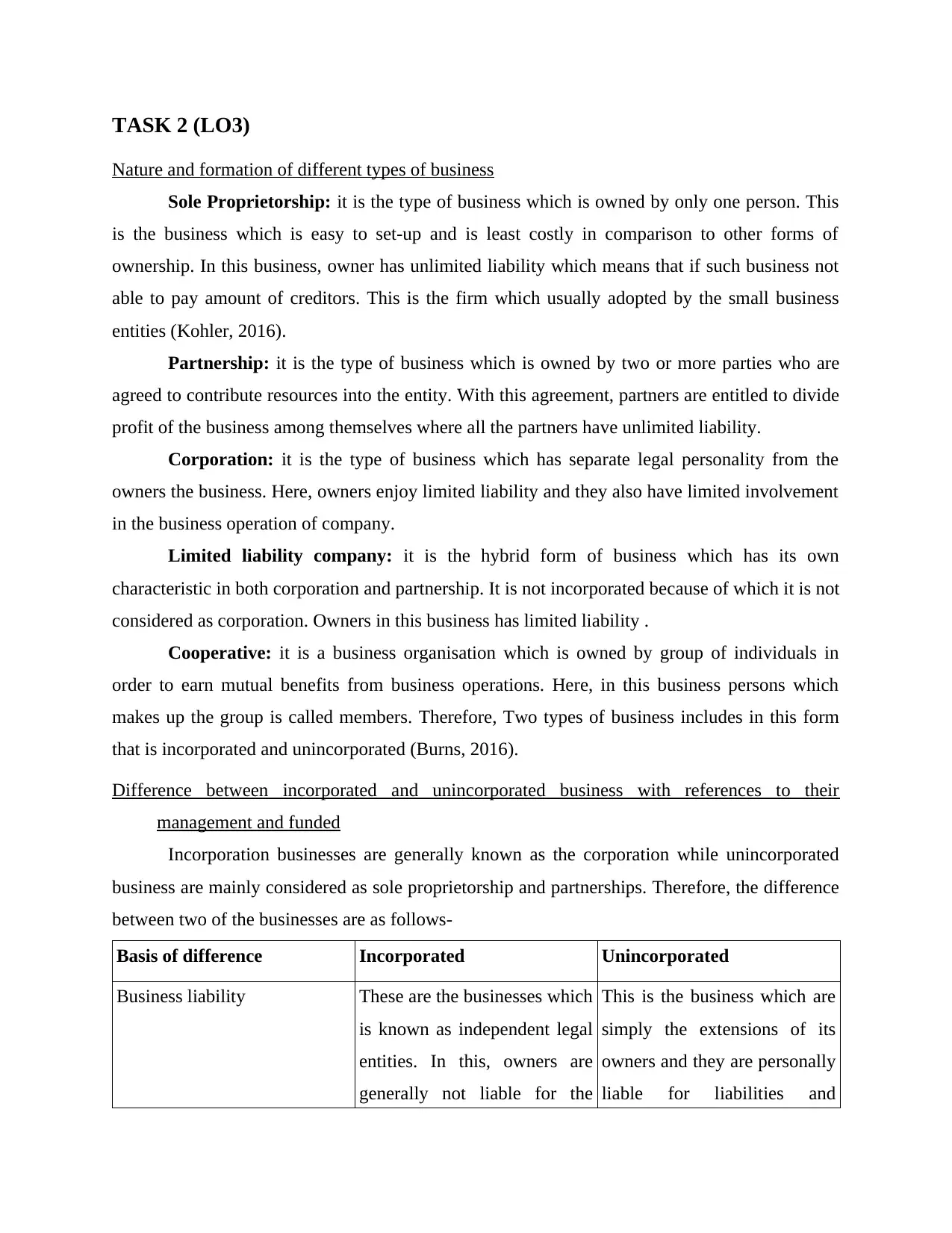
TASK 2 (LO3)
Nature and formation of different types of business
Sole Proprietorship: it is the type of business which is owned by only one person. This
is the business which is easy to set-up and is least costly in comparison to other forms of
ownership. In this business, owner has unlimited liability which means that if such business not
able to pay amount of creditors. This is the firm which usually adopted by the small business
entities (Kohler, 2016).
Partnership: it is the type of business which is owned by two or more parties who are
agreed to contribute resources into the entity. With this agreement, partners are entitled to divide
profit of the business among themselves where all the partners have unlimited liability.
Corporation: it is the type of business which has separate legal personality from the
owners the business. Here, owners enjoy limited liability and they also have limited involvement
in the business operation of company.
Limited liability company: it is the hybrid form of business which has its own
characteristic in both corporation and partnership. It is not incorporated because of which it is not
considered as corporation. Owners in this business has limited liability .
Cooperative: it is a business organisation which is owned by group of individuals in
order to earn mutual benefits from business operations. Here, in this business persons which
makes up the group is called members. Therefore, Two types of business includes in this form
that is incorporated and unincorporated (Burns, 2016).
Difference between incorporated and unincorporated business with references to their
management and funded
Incorporation businesses are generally known as the corporation while unincorporated
business are mainly considered as sole proprietorship and partnerships. Therefore, the difference
between two of the businesses are as follows-
Basis of difference Incorporated Unincorporated
Business liability These are the businesses which
is known as independent legal
entities. In this, owners are
generally not liable for the
This is the business which are
simply the extensions of its
owners and they are personally
liable for liabilities and
Nature and formation of different types of business
Sole Proprietorship: it is the type of business which is owned by only one person. This
is the business which is easy to set-up and is least costly in comparison to other forms of
ownership. In this business, owner has unlimited liability which means that if such business not
able to pay amount of creditors. This is the firm which usually adopted by the small business
entities (Kohler, 2016).
Partnership: it is the type of business which is owned by two or more parties who are
agreed to contribute resources into the entity. With this agreement, partners are entitled to divide
profit of the business among themselves where all the partners have unlimited liability.
Corporation: it is the type of business which has separate legal personality from the
owners the business. Here, owners enjoy limited liability and they also have limited involvement
in the business operation of company.
Limited liability company: it is the hybrid form of business which has its own
characteristic in both corporation and partnership. It is not incorporated because of which it is not
considered as corporation. Owners in this business has limited liability .
Cooperative: it is a business organisation which is owned by group of individuals in
order to earn mutual benefits from business operations. Here, in this business persons which
makes up the group is called members. Therefore, Two types of business includes in this form
that is incorporated and unincorporated (Burns, 2016).
Difference between incorporated and unincorporated business with references to their
management and funded
Incorporation businesses are generally known as the corporation while unincorporated
business are mainly considered as sole proprietorship and partnerships. Therefore, the difference
between two of the businesses are as follows-
Basis of difference Incorporated Unincorporated
Business liability These are the businesses which
is known as independent legal
entities. In this, owners are
generally not liable for the
This is the business which are
simply the extensions of its
owners and they are personally
liable for liabilities and
Paraphrase This Document
Need a fresh take? Get an instant paraphrase of this document with our AI Paraphraser
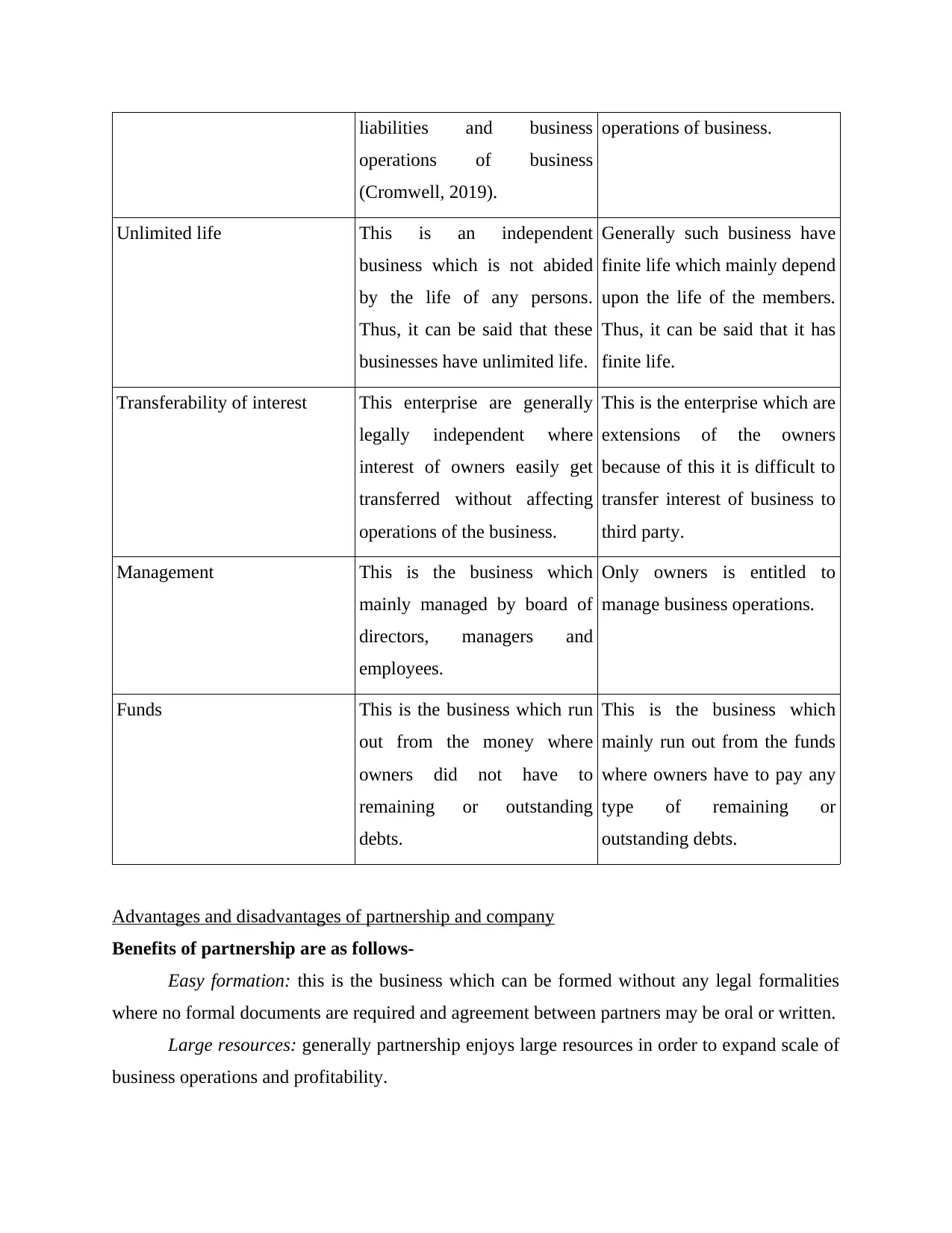
liabilities and business
operations of business
(Cromwell, 2019).
operations of business.
Unlimited life This is an independent
business which is not abided
by the life of any persons.
Thus, it can be said that these
businesses have unlimited life.
Generally such business have
finite life which mainly depend
upon the life of the members.
Thus, it can be said that it has
finite life.
Transferability of interest This enterprise are generally
legally independent where
interest of owners easily get
transferred without affecting
operations of the business.
This is the enterprise which are
extensions of the owners
because of this it is difficult to
transfer interest of business to
third party.
Management This is the business which
mainly managed by board of
directors, managers and
employees.
Only owners is entitled to
manage business operations.
Funds This is the business which run
out from the money where
owners did not have to
remaining or outstanding
debts.
This is the business which
mainly run out from the funds
where owners have to pay any
type of remaining or
outstanding debts.
Advantages and disadvantages of partnership and company
Benefits of partnership are as follows-
Easy formation: this is the business which can be formed without any legal formalities
where no formal documents are required and agreement between partners may be oral or written.
Large resources: generally partnership enjoys large resources in order to expand scale of
business operations and profitability.
operations of business
(Cromwell, 2019).
operations of business.
Unlimited life This is an independent
business which is not abided
by the life of any persons.
Thus, it can be said that these
businesses have unlimited life.
Generally such business have
finite life which mainly depend
upon the life of the members.
Thus, it can be said that it has
finite life.
Transferability of interest This enterprise are generally
legally independent where
interest of owners easily get
transferred without affecting
operations of the business.
This is the enterprise which are
extensions of the owners
because of this it is difficult to
transfer interest of business to
third party.
Management This is the business which
mainly managed by board of
directors, managers and
employees.
Only owners is entitled to
manage business operations.
Funds This is the business which run
out from the money where
owners did not have to
remaining or outstanding
debts.
This is the business which
mainly run out from the funds
where owners have to pay any
type of remaining or
outstanding debts.
Advantages and disadvantages of partnership and company
Benefits of partnership are as follows-
Easy formation: this is the business which can be formed without any legal formalities
where no formal documents are required and agreement between partners may be oral or written.
Large resources: generally partnership enjoys large resources in order to expand scale of
business operations and profitability.
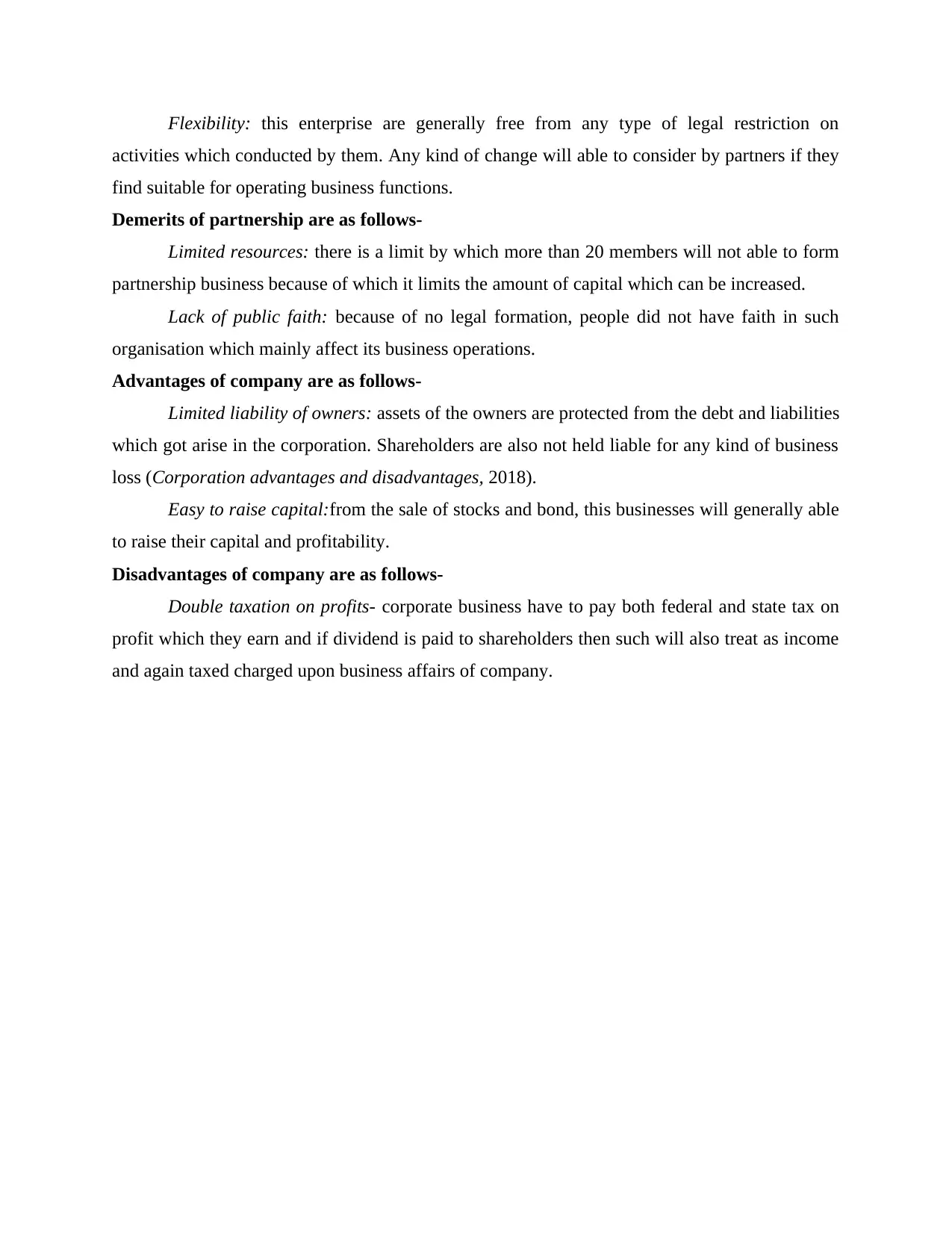
Flexibility: this enterprise are generally free from any type of legal restriction on
activities which conducted by them. Any kind of change will able to consider by partners if they
find suitable for operating business functions.
Demerits of partnership are as follows-
Limited resources: there is a limit by which more than 20 members will not able to form
partnership business because of which it limits the amount of capital which can be increased.
Lack of public faith: because of no legal formation, people did not have faith in such
organisation which mainly affect its business operations.
Advantages of company are as follows-
Limited liability of owners: assets of the owners are protected from the debt and liabilities
which got arise in the corporation. Shareholders are also not held liable for any kind of business
loss (Corporation advantages and disadvantages, 2018).
Easy to raise capital:from the sale of stocks and bond, this businesses will generally able
to raise their capital and profitability.
Disadvantages of company are as follows-
Double taxation on profits- corporate business have to pay both federal and state tax on
profit which they earn and if dividend is paid to shareholders then such will also treat as income
and again taxed charged upon business affairs of company.
activities which conducted by them. Any kind of change will able to consider by partners if they
find suitable for operating business functions.
Demerits of partnership are as follows-
Limited resources: there is a limit by which more than 20 members will not able to form
partnership business because of which it limits the amount of capital which can be increased.
Lack of public faith: because of no legal formation, people did not have faith in such
organisation which mainly affect its business operations.
Advantages of company are as follows-
Limited liability of owners: assets of the owners are protected from the debt and liabilities
which got arise in the corporation. Shareholders are also not held liable for any kind of business
loss (Corporation advantages and disadvantages, 2018).
Easy to raise capital:from the sale of stocks and bond, this businesses will generally able
to raise their capital and profitability.
Disadvantages of company are as follows-
Double taxation on profits- corporate business have to pay both federal and state tax on
profit which they earn and if dividend is paid to shareholders then such will also treat as income
and again taxed charged upon business affairs of company.
⊘ This is a preview!⊘
Do you want full access?
Subscribe today to unlock all pages.

Trusted by 1+ million students worldwide
1 out of 20
Related Documents
Your All-in-One AI-Powered Toolkit for Academic Success.
+13062052269
info@desklib.com
Available 24*7 on WhatsApp / Email
![[object Object]](/_next/static/media/star-bottom.7253800d.svg)
Unlock your academic potential
Copyright © 2020–2026 A2Z Services. All Rights Reserved. Developed and managed by ZUCOL.



